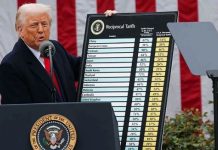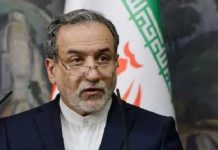Seoul, Dec 8 (AFP/APP/DNA):South Korean President Yoon Suk Yeol’s future remained uncertain Sunday after surviving an impeachment vote over his brief imposition of martial law.
The defence minister in charge when Yoon suspended civilian law late Tuesday was meanwhile reportedly arrested on Sunday and his official residence and office raided.
A boycott by Yoon’s party killed off the impeachment motion late Saturday even as huge crowds braved freezing temperatures outside parliament to demand his ouster.
But the deeply unpopular president’s survival may be short-lived, with Yoon’s People Power Party (PPP) saying that it had “effectively obtained (Yoon’s) promise to step down”.
“Until the president steps down, the president will be effectively excluded from his duties,” it said in a statement.
PPP leader Han Dong-hoon and Prime Minister Han Duck-soo were set to meet at 11:00 am (0200 GMT) to discuss plans for Yoon’s “orderly retreat”, the premier’s office said.
A cabinet meeting will follow at 2:00 pm.
The failure of the impeachment motion “means a more protracted political crisis”, Vladimir Tikhonov, professor of Korean Studies at the University of Oslo, told AFP.
“We will have a politically dead president — basically unable to govern any longer — and hundreds of thousands coming to the streets every week until Yoon is removed,” he said.
– Sorry –
On Saturday before the vote, Yoon, 63, reappeared for the first time in three days and apologised for the “anxiety and inconvenience”. He said he would leave it to his party to decide his fate.
Massive crowds — police said there were 150,000 people, organisers one million — gathered outside parliament into the evening to pressure lawmakers to oust the president.
Many wore elaborate outfits, carrying home-made flags and waving colourful glow sticks and LED candles as K-pop tunes blasted from speakers.
“Even though we didn’t get the outcome we wanted today, I am neither discouraged nor disappointed because we will get it eventually,” said protester Jo Ah-gyeong, 30, after the impeachment vote.
“I’ll keep coming here until we get it,” she told AFP.
The opposition has already vowed to try to impeach Yoon again as soon as Wednesday, and many protesters vowed to continue demonstrations next weekend.
“I will impeach Yoon Suk Yeol, who has become the worst risk for South Korea, at any cost,” opposition leader Lee Jae-myung said.
– Insurrection –
Regardless of the political situation, police are investigating Yoon and others for alleged insurrection over the extraordinary events of Tuesday night.
Early Sunday police arrested Kim Yong-hyun, who quit as defence minister on Wednesday and who was slapped with a travel ban, reports said.
Kim’s arrest came about six hours after he showed up for questioning at 1:30 am, Yonhap reported.
Declaring martial law late Tuesday, Yoon said it would safeguard South Korea “from the threats posed by North Korea’s communist forces and eliminate anti-state elements plundering people’s freedom and happiness”.
Security forces sealed the National Assembly, helicopters landed on the roof and almost 300 soldiers tried to lock down the building.
But as parliamentary staffers blocked the soldiers with sofas and fire extinguishers, enough MPs got inside — many climbed walls to enter — and voted down Yoon’s move.
The episode brought back painful memories of South Korea’s autocratic past and blindsided its allies, with the US administration only finding out via television.
“This is a country we’ve spent our entire lives building,” Shin Jae-hyung, 66, who suffered arrest and torture in the 1970s and 80s as he battled successive military-led regimes, told AFP.
The head of South Korean special forces said he had been ordered to “drag out” lawmakers from parliament.
A purported arrest list included opposition leader Lee, National Assembly Speaker Woo Won-shik, and PPP leader Han.
The ruling party’s vote boycott “might delay the demise of Yoon’s tenure but won’t prevent it,” Gi-Wook Shin, a sociology professor at Stanford University, told AFP.
“Its road will be messier,” he said.
















